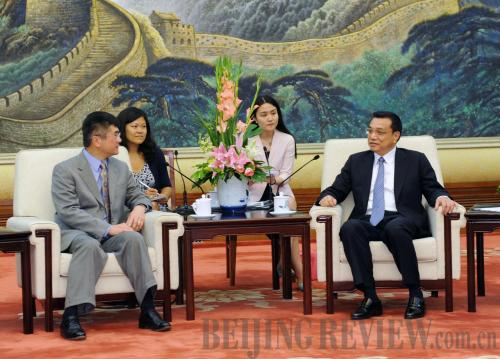|
 |
|
BUSINESS ADVOCATE: U.S. Commerce Secretary Gary Locke talks with Chinese Vice Premier Li Keqiang in Beijing on May 20, 2010, during Locke's visit to China (LI TAO) |
The fact that Obama is sending an acting cabinet member to serve as U.S. ambassador to China illustrates the importance of China in his long-term economic strategy. Locke is the first cabinet member to assume this role since 1979, when China and the United States established diplomatic relations.
This decision shows the Obama administration's emphasis on Sino-U.S. economic and trade relations. It wants an expert and it just happens to have one in its ranks.
The major task for a U.S. ambassador to China is to deliver information between the Chinese Government and the U.S. Government, and help solve bilateral issues that may arise during his tenure. Issues involving economic and trade relations will certainly be Locke's priority.
Locke's appointment may send a message the United States will shift its attention to economic and trade cooperation from geopolitical issues, which plagued Sino-U.S. relations throughout last year.
China needs to take note that Obama's recent measures show economic diplomacy may become his policy orientation for the next two years.
Locke's Chinese ancestry presents a double-edged sword situation. As a political figure, he cannot go overboard with his intimacy for China and its culture; otherwise, it will be difficult for him to get approval from politicians in the United States.
This is similar to Obama's and his predecessor George W. Bush's respective visits to China. Though they smiled and behaved friendly while in China, at their next stops they often expressed dissatisfaction or even criticism of China.
The Chinese people don't need to be too excited for Locke's arrival. His selection was nothing more than Obama's pick of the right man for the job based on political considerations. It could be a show of goodwill. But winning political and economic victories for the United States and maintaining prosperous relations with China are the ultimate aims of the nomination.
The author is a research fellow with the Chinese Academy of Social Sciences
U.S. Ambassadors to China
Jon Huntsman (Since August 2009)
Clark Randt (July 2001-January 2009)
Joseph Prueher (December 1999-May 2001)
James Sasser (February 1996-July 1999)
Stapleton Roy (August 1991-June 1995)
James Lilley (May 1989-May 1991)
Winston Lord (November 1985-April 1989)
Arthur Hummel (September 1981-September 1985)
Leonard Woodcock (March 1979-February 1981)
(Source: beijing.usembassy-china.org.cn)
| 